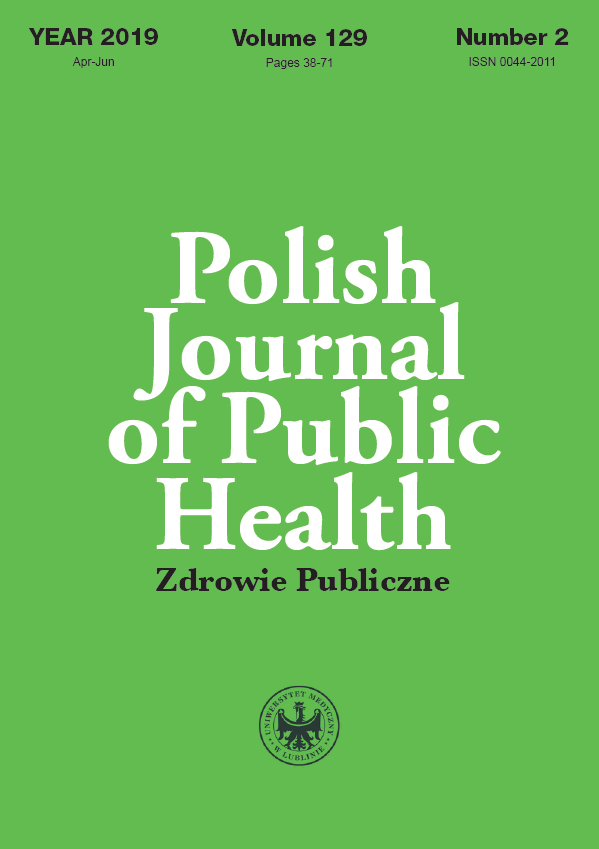Psychological support of students with national identity transformations
DOI:
https://doi.org/10.2478/pjph-2019-0010Keywords:
national identity, norm, transformation, studentsAbstract
Introduction. The research of the development of national identity of student’s youth is important for a deeper understanding of the factors of psychological security preservation, stability of nations and psychological health of their representatives. The recent intensification of globalisation, integration and migration processes in the European space makes especially relevant the problem of development of positive national identity among its youth citizens and the correction of transformations in this process. Therefore, the development of effective psychological support of student’s youth with transformed national identity is necessary.
Aim. The article aims at conducting theoretical and empirical research of transformed types of national identity among students of higher educational institutions displaying national hypoidentity (national nihilism), national indifference or national hyperidentity (national egoism, national isolationism, national fanaticism); as well as at developing and organising their psychological support.
Material and methods. The study involved full-time first – fourth year students of higher education institutions from different regions of Ukraine who ensured the representativeness of sample. The age range of 17-21 to which the respondents belong is sensitive regarding the development of national identity. To reveal the type of students’ national identity, psychodiagnostic methods (“Types of ethnic identity” by G. Soldatova, S. Ryzhova) and methods of assessing the positivity and uncertainty of ethnic identity were applied (by A. Tatarko, N. Lebedeva), and methods of mathematical statistics were applied to assess the obtained data.
Results. Empirical research of 309 students of higher educational institutions demonstrated that 53 students had the transformed types of national identity that required correction in the process of organised psychological support. After all, the transformations of national identity primarily threaten the psychological health of the personality.
Discussion. Psychological support of students with national identity transformations (national hypoidentity, national indifference and national hyperidentity) should be directed towards the development of their positive national identity. To do this, such support should be organised separately for students with national hypoidentity and national indifference promoting the development of their positive attitude towards the representatives of their nation, and for students with national hyperidentity promoting the development of their tolerant attitude towards the representatives of other nations.
Conclusion. Most students of higher educational institutions develop positive national identity (norm). A small number of students have deviations from the norm displaying the transformation of their national identity. The main purpose of psychological support of students with national identity transformations is the development of positive national identity.
References
1. Bhawuk DPS, Brislin RW. Cross-cultural Training: A Review. Appl Psychol Int Rev. 2000;49:162-91.
2. Erikson E. Identity, youth and crisis. New York; Norton: 1968.
3. Marsia J. Identity in adolescent. In: J. Adelson. Handbook of adosescent psychology. New York: Wiley; 1985. p. 157-80.
4. Piontkovska DV. The problem of contrast between the concepts of „National Identity” and „Ethnic Identity” in psychological science. Eur J Appl Sci. 2014;1:91-3.
5. Soldatova GY. Psychology of Interethnic Tension. Moscow: Smysl; 1998.
6. Spivak LN. Psychological foundations for the development of the young person’s national self-consciousness. Eur J Appl Sci. 2014;1:94-6.
7. Spivak LM. Psychology of development of personality’s national self-consciousness in youth. Kamyanets-Podilsky: Ruta; 2015.
8. Stefanenko TH. Ethnopsychology: workshop. Moscow: Aspect-Press; 2006.
9. Tatarko AN, Lebedeva NM. Methods of ethnical and cross-cultural psychology. Moscow: Economics High School; 2011.
10. Triandis H. Culture and social behaviour. New York: McGraw-Hill; 1994.
Downloads
Published
Issue
Section
License
Copyright (c) 2019 Polish Journal of Public Health

This work is licensed under a Creative Commons Attribution-NonCommercial-NoDerivatives 3.0 Unported License.


